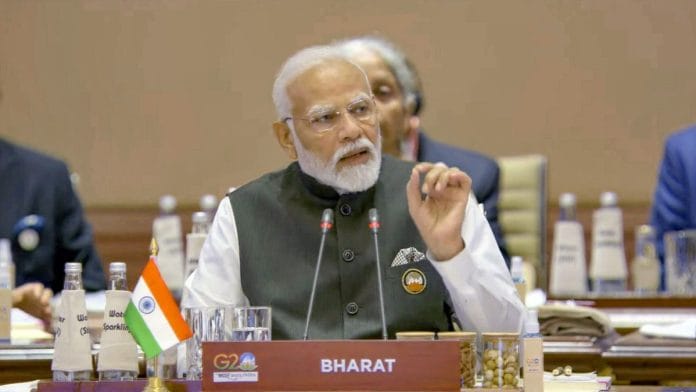India, that is Bharat, played host to leaders of G20 member states who flocked to the capital city of Delhi for the 18th G20 Leaders’ Summit held on 9-10 September. This assemblage was unlike any other since the first G20 Summit in 2008 held in Washington DC, US.
That this was a historic event was not lost on either the US, China, or India — the ‘G3’ as World Economic Forum (WEF) President Børge Brende calls them. Its significance was underscored by the fact that the Indian G20 presidency was able to secure a consensus on the phrasing of the New Delhi Leaders’ Declaration, which was unanimously adopted by member states.
The summit also marked the launch of the Global Biofuels Alliance, the promising India-Middle East-Europe Economic Corridor, and more importantly, induction of the African Union into the grouping.
Crucial junctures in history
Chinese President Xi Jinping’s decision to skip the summit and send Premier Li Qiang instead turned out to be Beijing’s loss.
Summitry, needless to say, is very serious business; more so at a time when a redefined geopolitical architecture is being put in place. At the centre of this changing world order are two of the world’s biggest democracies, which together account for nearly one-fifth of the global population. How the Indian tech industry and Silicon Valley are able to march in lockstep shows the trajectory and extent of the ‘strategic partnership’ between India and the US. The resounding success of the summit was proof that the G20 grouping recognises India’s balancing role between China and the US as the world teeters on the brink of new, uncertain grounds.
The West has driven Russia firmly into the arms of China, and the US — the 800-pound gorilla in the room — is proactively reducing its dependence on Chinese supply chains. It is important to see this decoupling in conjunction with reports of India and the US unobtrusively setting up undersea infrastructure in the Indian Ocean, complete with naval fortifications.
As India navigates its evolving role on the global stage, the importance of strengthening ties with the US cannot be overstated. This partnership is crucial for addressing shared challenges and enhancing regional stability.
Also read: How do you count the takeaways from India’s G20? It’s as simple as ABCD
Against this expansive backdrop, the summit in New Delhi will be viewed in the years to come as one of the crucial junctures in history, similar to the post-World War II era, that paved the way for a new world order. This order, it seems, will be likely characterised by tension-laced cooperation between the ‘Free World’ and the ‘Not So Free World’.
And it doesn’t hurt the government in New Delhi that the G20 leaders’ summit serves as a reminder of why it will be difficult for Prime Minister Narendra Modi’s political adversaries to present a convincing alternative to BJP in the 2024 general elections. The success of the Chandrayaan-3 mission and the launch of India’s first solar mission Aditya L1 couldn’t have come at a better time.
To their credit, Modi’s team took the many challenges in their way head-on. Minister of External Affairs S. Jaishankar and his team of highly-skilled diplomats leveraged the summit not just to consolidate India’s prominence on the global stage but also to awaken the country’s young population to Modi’s larger geopolitical ambitions. The result is there for all to see — youngsters in India are becoming more aware and curious about the state of the world than ever before. Even in foreign lands, India’s revolutionary digital payments infrastructure is enabling conversations while imparting a sense of pride among the diaspora.
This confidence in India’s ability to achieve accelerated growth will have to be matched with initiatives such as The Rocketship India track at TiEcon 2023. Such initiatives could power India’s tech revolution, besides assisting the government to partner with capable stakeholders.
Asha Jadeja is a Silicon Valley-based entrepreneur, venture capitalist, philanthropist and a ‘change agent’. She tweets @ashajadeja325. Views are personal.
The article is sponsored by the Motwani Jadeja Foundation.






